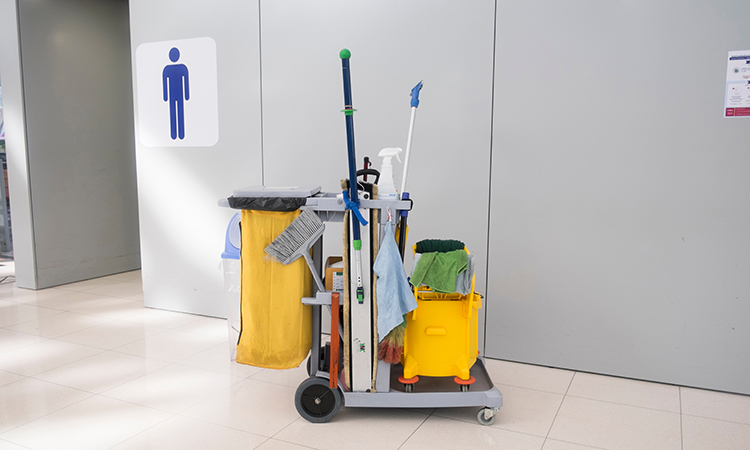How to create a robust sanitary protocol for your airport’s restrooms
Posted: 16 June 2021 | Robson Freitas | No comments yet
Robson Freitas, Head of Operations and Passenger Experience at Belo Horizonte International Airport in Brazil, speaks to International Airport Review about the measures that the airport is undertaking to keep its restrooms clean and to promote health security.


The COVID-19 pandemic has had a significant impact on our lives, especially in the way that we travel and use airports. Civil aviation experienced a sharp drop of 80 per cent in world aircraft movements at first, due to the closure of borders, which was catastrophic for the airport sector.
COVID-19 will forever change the way in which airports carry out their cleaning activities”
With the increase in confirmed cases of COVID-19, the fear of contamination hit the world population. However, with the magnitude of the crisis faced, it is also necessary to adopt a coping approach that reduces the risk of contamination for travellers and workers in the sector and rebuilds passenger confidence.
As a result, airports must implement extensive sanitary protocols in their terminals and in their administrative areas.
Join our free webinar: Revolutionising India’s travel experience through the Digi Yatra biometric programme.
Air travel is booming, and airports worldwide need to move passengers faster and more efficiently. Join the Digi Yatra Foundation and IDEMIA to discover how this groundbreaking initiative has already enabled over 60 million seamless domestic journeys using biometric identity management.
Date: 16 Dec | Time: 09:00 GMT
rEGISTER NOW TO SECURE YOUR SPOT
Can’t attend live? No worries – register to receive the recording post-event.
COVID-19 will forever change the way in which airports carry out their cleaning activities, accelerating technological development, process optimisation and, above all, robust planning of routines that ensure a safe environment for travellers.
Planning
Although there are still no studies that recommend specific products to combat COVID-19, the best course of action is towards multi-purpose or two-in-one (cleaning and disinfection) for the elimination of microorganisms, with the use of general or hospital disinfectant products, respecting the dilution and contact time displayed on the label.
Monthly, a working group meets to discuss the planning for the following month, which defines the strategy that will be adopted for the cleaning routines of toilets and common areas”
It is recommended that the chemicals used in the cleaning and disinfection of airport toilets display the instructions on the label, form of use, registration number (or notification number) with the Brazilian National Health Surveillance Agency (ANVISA) and the category of use in order to ensure its effectiveness.
Monthly, a working group at Belo Horizonte International Airport (CNF) meets to discuss the planning for the following month, which – based on the passenger curve or the historical pattern of the movement of travellers – defines the strategy that will be adopted for the cleaning routines of toilets and common areas, including the quantity of labour and necessary materials, as well as closing or opening toilets due to the low movement of passengers on certain days and/ or times.
The daily planning of toilet activities includes cleaning, disinfection and washing in all toilets and is frequently reviewed and validated by ANVISA.
Passenger satisfaction survey
In Brazil, the National Civil Aviation Agency (ANAC) and the Secretary of Civil Aviation (SAC) conduct a monthly survey of passengers with a focus on the quality of services provided by airports. The survey includes questions on general cleaning and airport restrooms. The annual results of the goals stipulated by the National Civil Aviation Agency grants a bonus to the airport through the readjustment of its boarding fees, reflecting positively in the airport’s aeronautical revenues. In view of the importance of the perception of travellers, Belo Horizonte Airport monitors the results through quality and passenger experience, developing action plans (5W2H) and projects, especially with regards to cleaning its restrooms.
ACI Accreditation
Belo Horizonte Airport was recognised for its efforts to protect travellers, visitors and airport workers during the pandemic, so much so that Airports Council International (ACI) recently accredited the airport with the ACI Airport Health Accreditation (AHA). The programme provides airports with an assessment of how aligned their health measures are with the ACI Aviation Business Restart and Recovery guidelines and the International Civil Aviation Organization’s (ICAO) Council Aviation Restart Task Force (CART) recommendations, along with industry best practice. All in all, more than 270 airports worldwide have already been certified by ACI, and the title is valid for 12 months.
Technology
In partnership with an outsourced cleaning company, Belo Horizonte Airport is implementing access counting software and real-time monitoring of sanitary cleaning routines. Now, the airport’s Operations Centre has access to information on how many users have accessed a particular restroom and whether the quantity has exceeded the maximum access limit, which will require an unscheduled spot cleaning. It also allows the Operations Centre to track online cleaning routines and identify when an area was last cleaned, or send an alert to the outsourced cleaning company’s leadership when a scheduled activity has not been carried out or when the restrooms are in need of extra cleaning due to a higher level of use.
In partnership with an outsourced cleaning company, Belo Horizonte Airport is implementing access counting software and real-time monitoring of sanitary cleaning routines”
Another technological solution implemented by Belo Horizonte Airport was the development of an electronic checklist via Office 365, allowing passenger terminal agents to inspect routine cleaning activities, generating scores from one to five where they classify as ‘satisfactory’ or ‘not satisfactory’ the cleanliness and condition of the restrooms. To ensure this routine of checks, an operational meeting is held twice a day between the airport’s Duty Station Manager and the coordinator of the outsourced cleaning company. This meeting discusses preventive and corrective actions with a focus on cleaning toilets, in addition to some performance indicators.
The Airport Operations Centre (APOC) is responsible for evaluating the results obtained from the electronic checklist of verifications, complaints or suggestions received through the airport Ombudsman and for monitoring the results of the satisfaction survey notes carried out by ANAC and SAC.
Personally, I was incredibly pleased with the team’s support and the way that they are proud to contribute to the implementation of this new technology introduced at the airport.
Now, it is possible to identify the deterioration of the restroom facilities and solve the problem before it becomes a complaint, generating engagement and consolidating the meaning of the work of service agents.
Future
Although new innovations hit the market every month, it is difficult for airports to know what will meet their needs”
The demand for airport restroom technology is increasing as airports seek to improve the passenger experience and operations. Although new innovations hit the market every month, it is difficult for airports to know what will meet their needs. If we consider the market trends, the demands of travellers and anticipate the new permanent changes that will occur in the cleaning of airport restrooms due to the pandemic, we can focus on technological solutions that best suit the infrastructure and costs of the airport.
Having smart bathrooms doesn’t mean implementing new technologies. It also means being very aware of the processes and procedures that are necessary to ensure cleaning routines, as clean restrooms have a positive impact on passengers’ perception of health security.
Touchless processes
Airports will have to prepare, in their renovations or in future architectural projects, to install touchless features such as taps, soap dispensers and towel dispensers that turn on with the wave of a hand. Architectural projects that bring solutions with materials and components that facilitate cleaning activities, cleaning service providers that use modern and technological equipment to carry out the activities and intensive monitoring by the airport regarding the perception of travellers through surveys using QR Codes. Airports should provide points for hand washing not only in the areas of toilets, but also in areas of great circulation of people, such as food courts and parking lots. This will contribute to a better perception of the airport and will also contribute to reducing the flow of use and people in the toilets.
Belo Horizonte Airport has a key role to play in helping travellers through this global pandemic, by reassuring them that their safety in our top priority. With the huge priority on health and safety of travellers, employees and stakeholders, we are minimising the exposure from the transmission of the virus at the airport.
Robson Freitas – Head of Operations and Passenger Experience at Belo Horizonte International Airport – began his career in a Flight Operations Office during the early 2000s and worked for the main Brazilian airlines. In 2012, he was appointed as the Competitions and Team Services Coordinator for the FIFA World Cup Organising Committee Brazil, where he was responsible for supporting all of the Nation Teams’ air operations. He is also a helicopter pilot, but only briefly performed the activity, as he was invited to take over the Airport Operations Centre of Rio de Janeiro International Airport when it was granted to the private sector. Since 2018, he has worked in the operations area at Belo Horizonte Airport, where he is responsible for the Airport Operations Centre and is currently the Head of Operations.
Stay Connected with International Airport Review — Subscribe for Free!
Get exclusive access to the latest airport and aviation industry insights from International Airport Review — tailored to your interests.
✅ Expert-Led Webinars – Gain insights from global aviation leaders
✅ Weekly News & Reports – Airport innovation, thought leadership, and industry trends
✅ Exclusive Industry Insights – Discover cutting-edge technologies shaping the future of air travel
✅ International Airport Summit – Join our flagship event to network with industry leaders and explore the latest advancements
Choose the updates that matter most to you.
Sign up now to stay informed, inspired, and connected — all for free!
Thank you for being part of our aviation community. Let’s keep shaping the future of airports together!
Related topics
Airside operations, COVID-19, New technologies, Passenger experience and seamless travel, Safety, Terminal operations, Workforce
Related airports
Related organisations
Airports Council International (ACI World), Brazilian National Civil Aviation Agency (ANAC), Brazilian National Health Surveillance Agency (ANVISA), Brazilian Secretary of Civil Aviation (SAC), International Civil Aviation Organization (ICAO)


















